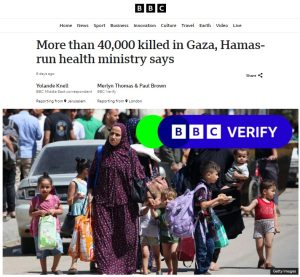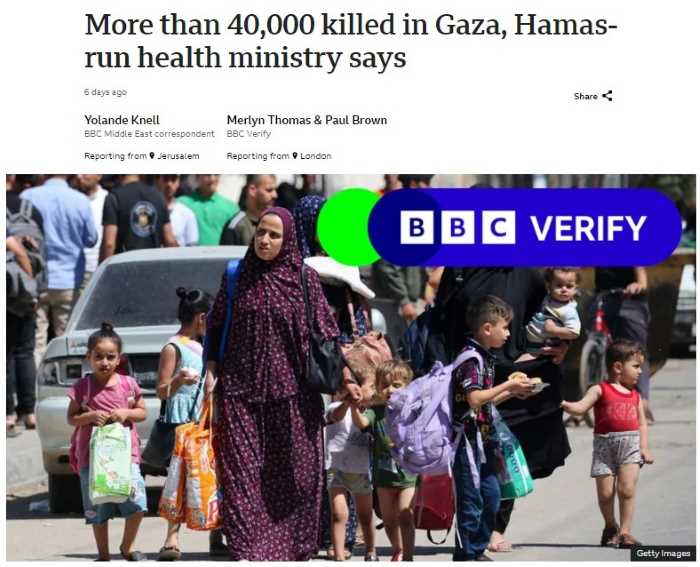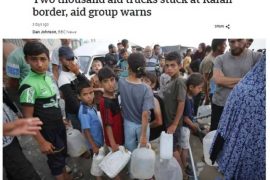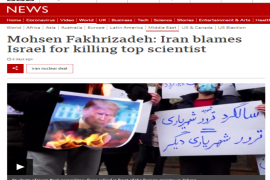On August 15th the Gaza ministry of health – which is of course run by the terrorist organisation that initiated the current war on October 7th 2023 – put out an announcement claiming that the death toll in the Gaza Strip had passed 40,000.
The fact that the sole source of that unconfirmed claim is a terrorist organisation proscribed by the British government and many others did not deter the BBC News website from publishing a report on that topic on the same day. Headlined “More than 40,000 killed in Gaza, Hamas-run health ministry says”, that report is credited to the BBC Jerusalem bureau’s Yolande Knell, along with two members of BBC Verify’s staff – Merlyn Thomas and Paul Brown. Readers are also told that the report includes additional reporting by Barbara Plett Usher in Jerusalem.
The contribution of two members of staff from the BBC’s fact-checking department BBC Verify to this report is particularly remarkable given that it is patently clear that no fact-checking or verification was conducted on the topic of Hamas’ claimed numbers. Readers are told that: [emphasis added]
“More than 40,000 Palestinians have been killed as a result of Israeli military action in Gaza since the 7 October Hamas-led attack on Israel, the Hamas-run health ministry says.
That number – 40,005 on Thursday – equates to about 1.7% of the 2.3 million population of the territory – another sobering indication of the human cost of the war. […]
The ministry’s figures for the number of people killed do not differentiate between civilians and fighters.
However, its breakdown of identified reported fatalities says a majority are children, women or elderly people.”
Knell and her colleagues make no effort to inform BBC audiences that Hamas’ figures include people killed by the actions of terrorist organisations, such as the Palestinian Islamic Jihad shortfall missile which caused the explosion at al Ahli hospital in October 2023, when Hamas claimed 471 deaths.
The report goes on:
“This month, Israel’s military told the BBC that more than 15,000 terrorists had been killed during the war.”
In fact, on the same day that Hamas put out the announcement that is the topic of this BBC report, the IDF Spokesman stated that more than 17,000 terror operatives had been killed in the Gaza Strip since the beginning of the war.
Readers may recall that six months ago a Hamas official told Reuters that some 6,000 of its operatives had already been killed but the BBC chose to ignore that story. Later the same month, BBC Verify – including Merlyn Thomas – published a bizarre report which, using statistics sourced from Hamas, sought to dismiss Israel’s estimation of the number of terrorists killed:
BBC VERIFY YET AGAIN PLAYS THE STOOGE FOR HAMAS CASUALTY FIGURES
The report by Knell and BBC Verify continues:
“International journalists, including the BBC, are blocked by Israel from entering Gaza independently, so are unable to verify figures from either side.
In the past, figures from the Gaza Ministry of Health (MoH) were widely used in times of conflict and seen as reliable by the UN and international institutions.”
That latter claim was previously promoted by BBC Verify in November 2023:
BBC’S FACT CHECK DEPARTMENT ROOTS FOR HAMAS CASUALTY FIGURES
Clearly BBC Verify has not carried out any serious investigation into that issue because had it done so, it would be able to inform BBC audiences that for at least a decade Hamas has employed a policy of deliberately failing to distinguish between civilian and combatant casualties for propaganda purposes and that its presentation of casualty figure ratios in past rounds of conflict has been shown to be unreliable. As noted here in the past:
“…during the 2008/9 three-week conflict, Hamas claimed that just 48 of around 1,300 casualties were combatants. Following an investigation, Israel provided the names of 709 Hamas operatives out of 1,166 casualties. Months later, Hamas admitted that between 600 -700 of its fighters had been killed. After the 2014 conflict, Hamas claimed that 70% of the 2,131 casualties were civilians. Later analysis showed that around 55% of the casualties were combatants.”
Throughout the past decade the BBC itself has failed to make any effort to independently verify casualty figures put out by Hamas – including at times when foreign journalists had access to the Gaza Strip – opting instead to blindly quote and promote statistics supplied by a terrorist organisation, with the result being that a significant number of Palestinian casualties resulting from the actions of terrorist groups have effectively been made to disappear by the world’s largest media organisation.
Following a section relating to the changing methodologies used to count casualties by various Hamas departments, Knell and her colleagues promote a link to a BBC Verify report from May which was previously discussed here:
LOOKING BEHIND THE BBC’S ‘70% WOMEN AND CHILDREN’ MANTRA
The report continues with a story told by a youth in the Gaza Strip:
“Ali Ashraf Ata Gheith, 15, told the BBC he spent two months digging his dead family from the wreckage of their bombed-out home.
His mother, father, brother and two sisters were killed when it was hit by a strike. Ali was in the building too, but survived after being trapped under the rubble for seven hours.
After he got out, he began trying to retrieve the bodies of his family.
“I could see my father under the rubble but I couldn’t extract him at first because he was under two columns of cement, and the ceiling would have collapsed. He decomposed in front of my eyes,” he said.”
Despite having earlier told readers that the BBC is “unable to verify figures” due to international journalists being “blocked by Israel from entering Gaza independently”, this report does not identify the person to whom Ali Gheith told his story, which also appeared in a filmed report by Barbara Plett Usher that was broadcast on the BBC News channel on August 15th.
The report by Knell, Thomas and Brown also relates to an additional topic:
“Satellite image analysis suggests that around 59.3% of buildings in Gaza have been damaged or destroyed since the beginning of the war.
The damage analysis, carried out by Corey Scher of City University of New York and Jamon Van Den Hoek of Oregon State University, compares images to reveal sudden changes in the height or structure of buildings.”
Readers may recall that BBC Verify promoted a similar story in late January:
BBC VERIFY TELLS A CONTEXT-FREE TALE OF DAMAGE AND DESTRUCTION
Readers are told that:
“The southern city of Rafah has sustained the highest rise in damaged buildings since March, according to the expert analysis.
The majority of the destruction came after Israel launched an offensive on the city on 6 May. The military says that taking control of the area and eliminating the remaining Hamas battalions is crucial to achieving its war aims.
In satellite imagery analysed by BBC Verify, large swathes of the city can be seen to be left in ruins – particularly around the border with Egypt and neighbourhoods to the north and south.
Social media videos verified by the BBC and footage shared by Israel’s military shows that areas across Rafah have been damaged or destroyed by aerial bombardment as well as demolition by Israeli forces on the ground. […]
Satellite imagery shows land has been cleared along the so-called Philadelphi corridor – a buffer zone along the 14km (9-mile) border with Egypt.
BBC Verify’s analysis of the imagery showed Israeli military vehicles in several areas where building clearance had taken place along the corridor. This includes a small neighbourhood located where the border meets the coast which was flattened within a month of the Rafah operation starting.”
Notably, while BBC Verify’s analysis tells readers that “[t]he operation has also destroyed key Rafah landmarks which includes the border crossing, several major mosques and the city’s main market”, it makes no mention whatsoever of the highly significant fact that the IDF has discovered – and destroyed – scores of tunnels in the Philadelphi corridor area, some of which were used to smuggle weapons into the Gaza Strip from Egypt.
The BBC has had over ten months in which to produce substantiated reporting on the topic of casualties in the Gaza Strip but has failed to do so. Instead – as has been its policy for over a decade – it continues to prefer to adopt the role of amplifier and promoter of claims put out by a terrorist organisation as part of its propaganda war.
Related Articles:





